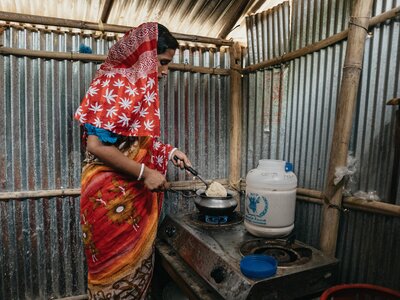Energy for food security
- Over 1.5 million
- people provided with direct access to clean cooking in 2023
- Over 61,000
- people provided with direct access to energy products and services for productive uses in 2023
- Almost 190,000
- fuel efficient stoves provided to homes and schools 2023
Energy is an engine of transformative socioeconomic opportunities that touches on every aspect of sustainable development and the ability to access energy is a fundamental enabler to achieving food security and zero hunger.
Not only is energy necessary to consume food – and most of the food that the World Food Programme (WFP) distributes to people in need requires cooking – but also throughout Food Systems to produce, process and preserve it.
WFP is implementing market-based, sustainable energy approaches that strengthen food assistance by providing people with the means to cook and communicate, and boost resilience activities that support local food value chains.
Areas of work
-
Modern cooking
-
WFP is the largest humanitarian agency providing food assistance in emergencies and through school feeding programmes. Most of this food needs cooking, which is most often done on open fires with firewood and charcoal. Traditional cooking has dramatic consequences on the environment (deforestation), socio-economic development (fuel collection time or purchasing cost), and public health (respiratory diseases). WFP introduces improved, clean and modern cooking solutions to households and schools.
-
Vouchers for energy
-
Promoting clean and modern cooking solutions, such as gas stoves, mini-gasifiers or electric pressure cookers, through WFP’s cash-based transfer approach, ensures that the poorest are not left behind. It empowers vulnerable households to make choices that improve their food security and wellbeing. Also, by injecting cash into the local economy, this approach supports local retailers and energy service providers; it builds energy market systems creating the needed conditions for long term impact.
-
Energy in schools
-
WFP promotes clean and modern cooking in school kitchens leveraging its presence in thousands of schools where it delivers school feeding programmes. Better cooking practices reduce environmental impact and improve socio-economic outcomes. Where solar electrification is possible, it delivers additional benefits such as lighting, digital learning and refrigeration for fresh food and medicines. At the centre of communities, schools act to showcase and diffuse innovation to surrounding areas.
-
Energy for agriculture
-
WFP builds the resilience and livelihoods of smallholder farmers through inclusive agricultural growth and the sustainable dissemination of energy equipment and services to boost agricultural market development, which in turn strengthens local food value chains.
-
Productive uses of energy – food production
-
Energy access for productive uses increases efficiency and crop yields through mechanisation of land clearing, preparation and harvesting. Water pumps allow for irrigation but also oxygenation of fishponds and water distribution and lifting for hydroponic applications.
-
Productive uses of energy – food processing and preservation
-
Renewable energy systems can also sustainably power food processing tasks, such as milling, saving time and increasing the quality of the produce. Energy-powered preservation (e.g. drying, smoking and refrigerated storage) reduces post-harvest food losses increasing the availability of nutritious foods and enabling farmers to control the timing of crop sales.






